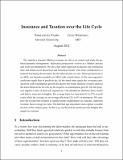Insurance and Taxation over the Life Cycle
Author(s)
Werning, Ivan; Farhi, Emmanuel
DownloadWerning_Insurance and taxation.pdf (396.8Kb)
OPEN_ACCESS_POLICY
Open Access Policy
Creative Commons Attribution-Noncommercial-Share Alike
Terms of use
Metadata
Show full item recordAbstract
We consider a dynamic Mirrlees economy in a life-cycle context and study the optimal insurance arrangement. Individual productivity evolves as a Markov process and is private information. We use a first-order approach in discrete and continuous time and obtain novel theoretical and numerical results. Our main contribution is a formula describing the dynamics for the labour-income tax rate. When productivity is an AR(1) our formula resembles an AR(1) with a trend where: (i) the auto-regressive coefficient equals that of productivity; (ii) the trend term equals the covariance productivity with consumption growth divided by the Frisch elasticity of labour; and (iii) the innovations in the tax rate are the negative of consumption growth. The last property implies a form of short-run regressivity. Our simulations illustrate these results and deliver some novel insights. The average labour tax rises from 0% to 37% over 40 years, whereas the average tax on savings falls from 12% to 0% at retirement. We compare the second best solution to simple history-independent tax systems, calibrated to mimic these average tax rates. We find that age-dependent taxes capture a sizable fraction of the welfare gains. In this way, our theoretical results provide insights into simple tax systems.
Date issued
2013-01Department
Massachusetts Institute of Technology. Department of EconomicsJournal
The Review of Economic Studies
Publisher
Oxford University Press
Citation
Farhi, E., and I. Werning. “Insurance and Taxation over the Life Cycle.” The Review of Economic Studies 80, no. 2 (April 15, 2013): 596-635.
Version: Author's final manuscript
ISSN
0034-6527
1467-937X